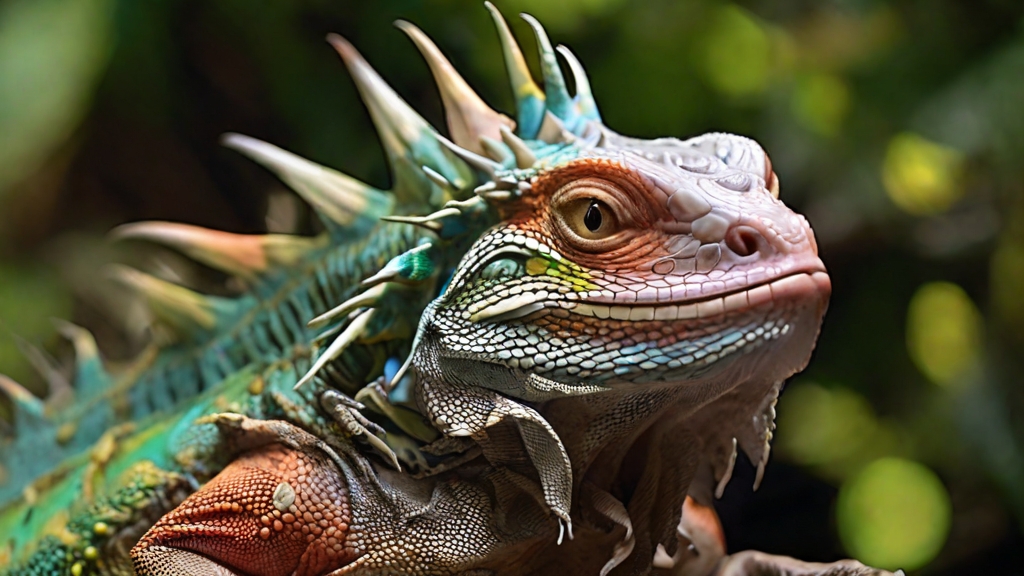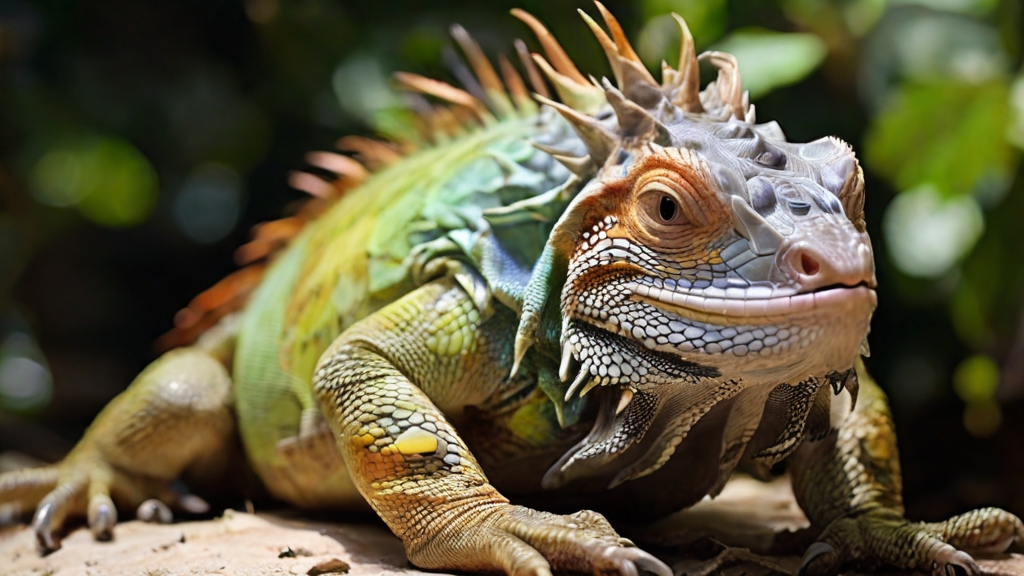When we think about reptiles, we often associate them with basking in the sun. This image is particularly true for iguanas, who rely on sunlight for various aspects of their lives.
In this article, we will delve into the essential role that sunlight plays in an iguana’s life, exploring their physiology, behavior, dietary needs, health, and how captivity can affect their access to this vital resource.
Understanding Iguanas
Before we can truly appreciate the importance of sunlight for iguanas, it’s crucial to understand what makes these reptiles unique. Iguanas belong to the family Iguanidae and are primarily found in Central and South America.
They are known for their distinctive appearance, with elongated bodies, sharp claws, and a dewlap (throat fan) that males use for communication and territorial displays.
The Connection Between Iguanas and Sunlight
Iguanas are ectothermic, meaning they are cold-blooded animals. Unlike mammals, which can regulate their body temperature internally, iguanas rely on external sources of heat, such as the sun, to stay warm. Sunlight is not just a source of warmth for iguanas; it is a lifeline that affects their overall well-being.
Iguanas as Cold-Blooded Reptiles
As cold-blooded reptiles, iguanas do not have the ability to generate their own body heat. Instead, they absorb heat from their environment, and sunlight provides the necessary warmth. This means that the ambient temperature of their surroundings directly influences their body temperature.
How Iguanas Regulate Their Body Temperature
Iguanas are masters of thermoregulation. They can control their body temperature by moving to areas with more or less sunlight. When they need to warm up, they bask in the sun, and when they want to cool down, they seek shade. This behavior helps them maintain an optimal body temperature for various physiological processes.
Sunlight and Thermoregulation
The availability of sunlight plays a significant role in an iguana’s ability to thermoregulate effectively. Without access to sunlight, they may struggle to maintain their ideal body temperature, which can lead to health issues.
The Importance of UVB Rays
One crucial aspect of sunlight for iguanas is the presence of ultraviolet B (UVB) rays. UVB rays are essential for the synthesis of vitamin D3 in their skin. Vitamin D3, in turn, is necessary for the absorption of calcium from their diet.
Basking Behavior
Iguanas exhibit a distinctive behavior known as basking. This involves them perching themselves on a sunny rock or branch, spreading their body to maximize exposure, and soaking up the sun’s rays. Basking helps iguanas raise their body temperature and allows them to digest their food effectively.
Sunlight and Activity Levels
Sunlight also influences an iguana’s activity levels. They are most active during the day when the sun is out. This increased activity allows them to forage for food, socialize, and engage in essential behaviors such as breeding.
Sunlight’s Impact on Breeding
Sunlight plays a critical role in iguana reproduction. The changing patterns of daylight trigger breeding behavior in many species of iguanas.
As the days lengthen, males become more territorial, and females prepare to lay eggs. Without adequate sunlight, these natural rhythms can be disrupted.
Iguanas’ Diet in the Wild
Iguanas in the wild have access to a diverse diet of plants, flowers, fruits, and even some insects. However, the nutritional value of their diet is heavily influenced by their ability to absorb calcium, which, as mentioned earlier, depends on exposure to sunlight.
Vitamin D Synthesis
In addition to thermoregulation, basking also serves another crucial purpose – vitamin D synthesis. When iguanas bask in the sun, their skin produces vitamin D3 in response to UVB exposure. This vitamin is essential for calcium absorption in their digestive system.
Sunlight’s Role in Calcium Absorption
Calcium is vital for iguanas’ bone health and muscle function. Without adequate calcium, they can develop metabolic bone disease, a painful and debilitating condition. Sunlight ensures that they can absorb calcium effectively from their diet, maintaining strong bones and overall health.
The Connection Between Sunlight and Strong Bones
Iguanas with access to proper sunlight are more likely to have robust skeletal structures, making them healthier and more resilient. Sunlight not only prevents disease but also contributes to their overall well-being.
Iguana Skin Health
Apart from its internal benefits, sunlight also has external advantages for iguanas. It helps maintain their skin health. Sunlight exposure can reduce the risk of skin infections and parasites, keeping them in top form.
Preventing Metabolic Bone Disease
One of the most severe health concerns for iguanas is metabolic bone disease (MBD). MBD is a condition that weakens the bones, causing deformities and fractures. Adequate exposure to sunlight is a primary preventative measure against MBD.
Parasite Reduction
Sunlight also has a natural cleansing effect on iguana skin. It can help reduce the presence of mites, ticks, and other external parasites that can harm these reptiles.
Sunlight as a Stress Reliever
In captivity, iguanas may experience stress due to confinement and changes in their environment. Sunlight can act as a stress reliever, promoting a sense of well-being and reducing anxiety.
Challenges of Providing Sunlight for Captive Iguanas
While sunlight is undoubtedly beneficial for iguanas, providing it to captive individuals can be challenging. Not all iguana owners have access to natural sunlight year-round, and indoor enclosures may not allow for sufficient UVB penetration.
UVB Lighting and Artificial Sunlight
To address this issue, many iguana owners use UVB lighting and artificial sunlight sources. These specialized bulbs mimic the UVB spectrum of natural sunlight, ensuring that captive iguanas can still synthesize vitamin D3 and maintain their health.
Creating a Proper Sunlight Environment
For iguana owners, creating a suitable environment with access to UVB lighting or natural sunlight is crucial. This includes providing a basking area with a UVB lamp, ensuring proper temperatures, and monitoring their behavior to guarantee they receive the light they need.
Conclusion
In conclusion, sunlight is not just a luxury for iguanas; it’s a necessity for their health and well-being. From thermoregulation and digestion to bone health and stress relief, sunlight plays a vital role in every aspect of an iguana’s life.
Whether in the wild or in captivity, ensuring they have access to the right lighting conditions is essential for their long-term happiness and survival.
FAQs
Can Iguanas be kept as pets without access to sunlight?
While it’s possible to keep iguanas as pets without natural sunlight, it’s essential to provide them with UVB lighting to ensure their health.
How often should I let my pet iguana bask in the sun?
Pet iguanas should be allowed to bask in the sun or under UVB lighting for a few hours every day.
What happens if my iguana doesn’t get enough sunlight?
Without adequate sunlight or UVB exposure, iguanas can develop metabolic bone disease and other health issues.
Can I take my pet iguana outside to get sunlight?
Yes, you can take your pet iguana outside to bask in the sun, but ensure they are in a safe and secure enclosure to prevent escape.
How can I tell if my iguana is getting enough sunlight?
Monitor your iguana’s behavior and overall health. Signs of insufficient sunlight include lethargy, loss of appetite, and bone deformities.




